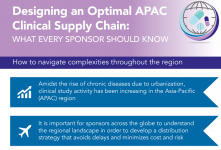McKesson's strategy unclear after $8.3bn Celsio takeover falls through

Merging Celsio with the pharma distribution and IT solutions company was supposed to bring together “complementary footprints, shared values and a history as a trusted partner going back 180 years,” McKesson CEO John Hammergren said when details of the $8.3bn takeover deal emerged in October.
However, on the same day as Hammergren presented at the J.P. Morgan Healthcare Conference, the company issued the results of the Celsio offer with news that it lacked shareholders’ support, failing to meet the 75% tender threshold.
Hammergren in a statement expressed his disappointment with the result, adding: “We are well positioned and will continue to explore and evaluate opportunities to further strengthen our businesses through our disciplined approach to capital allocation.”
Unclear Path Forward
James Vane-Tempest from Jeffries noted it is possible McKesson may look to launch another bid, after Chairman of the Supervisory Board of Celesio, Stephan Gemkow, said “it is a pity that the takeover bid has failed for the time being,” hinting at a re-offer.
If another bid does not materialize, McKesson may look to acquire the private EU wholesaler and retailer Phoenix, Vane-Tempest added. “We believe the pressure for a deal is increasing with further tie-ups in global drug procurement, and Celesio and Phoenix are the two remaining sizeable EU assets available with no such agreement in place.”
Reduced Odds
However Ross Muken, an analyst for the ISI Group, had seen the completion of the deal as only a having a 50% chance but has since in an analyst note lowered the odds further of another bid by the company being successful.
“This reduced probability reflects McKesson's M&A pricing discipline as well as its alternatives for capital deployment, including the potential of a combination of generics joint ventures, share repurchases, or other tuck-in acquisitions,” he said.
The merger would still be beneficial to McKesson by opening up the European and Latin American markets but, Muken said, these alternatives could be equally as beneficial without “the multi-year headache that comes with a renegotiation and the path to ultimately reach 100% ownership.”


















